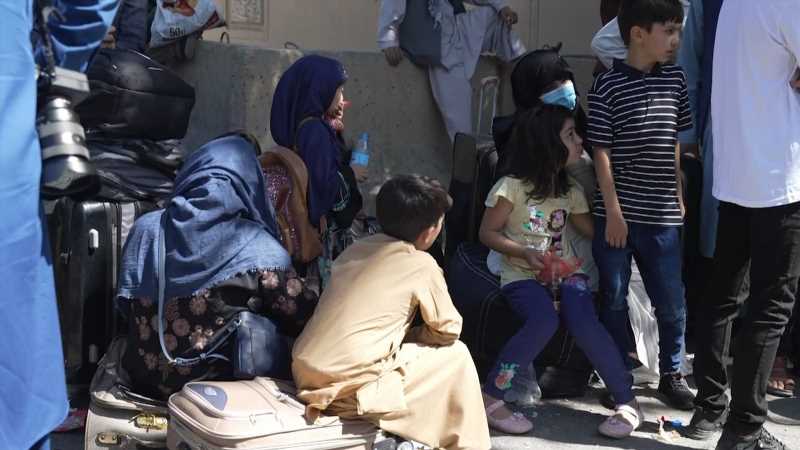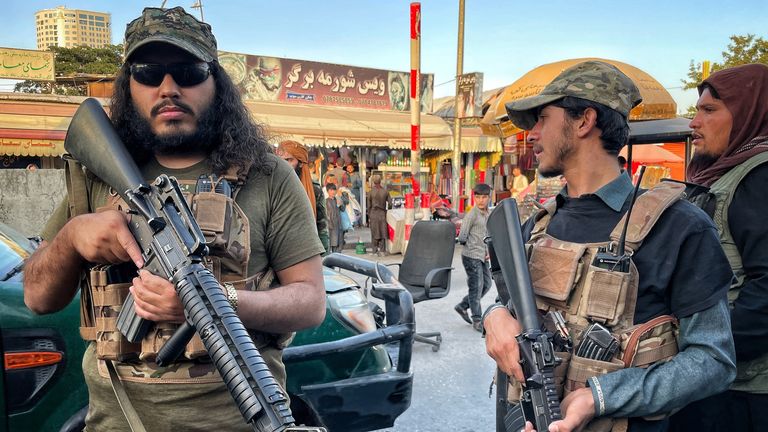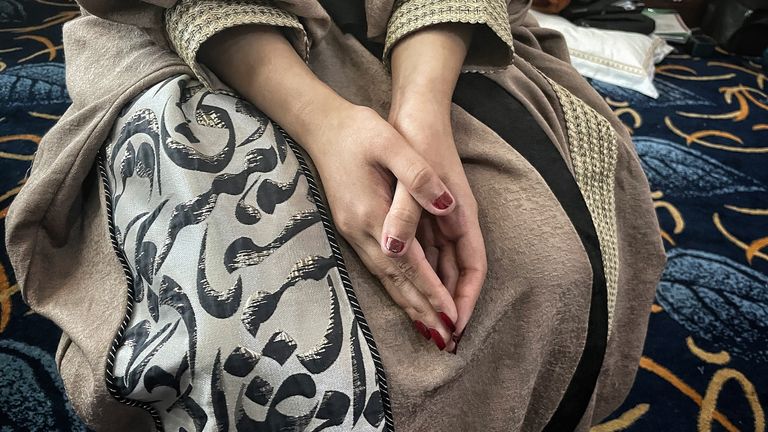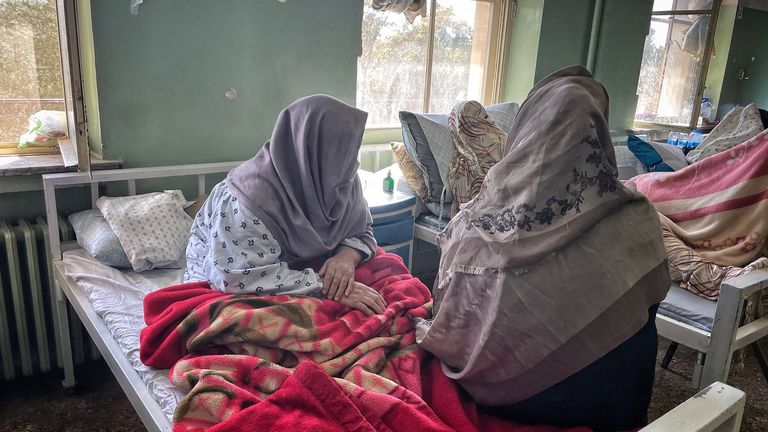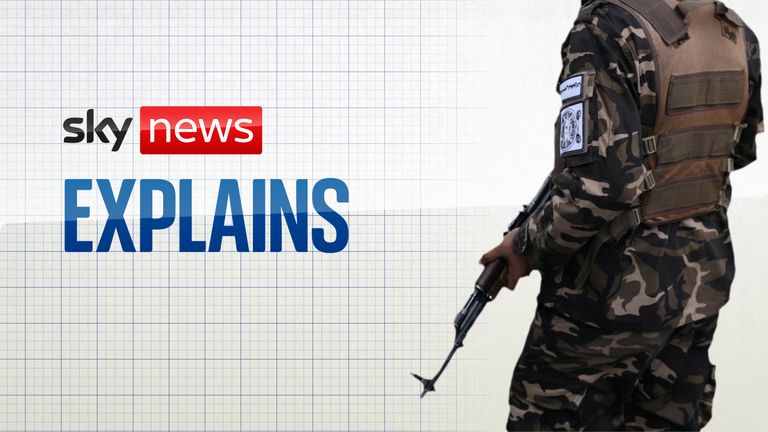The desperation of those in Afghanistan is heart-rending.
It’s in the faces of those who sit for hours with their children and their suitcases outside the building where one of the few airlifts is being organised.
It’s contained in the dozens of emails sent to me: “You are a journalist. I am too. Please help me. You are my only hope. If I die, tell the UK government that there was a girl that was killed by the Taliban just because of doing something for her people and her country.”
It’s in the multiple texts from human rights defenders who tell me the Taliban are knocking on their door and they don’t want to die.
“Please will anyone help us?”
It’s in the tears of a young journalist who silently shows us a video of himself where he’s being beaten by a Talib.
The Talib is using the butt of his weapon to hit his legs and back. He then ties the reporter’s hands and drags him along by rope that he’s attached to the back of his motorbike.
The torture and humiliation went on for two days before he escaped. The video is a few years old but the trauma is very present day – and back then, the Taliban were not in charge.
Now they are holding the guns and the levers of power. “If they catch me again, they will kill me,” the journalist says. This desperation is everywhere.
The state of Qatar is one of only two nations trying to operate airlifts. Pakistan is the other. But this involves careful and challenging negotiations with the Taliban who go through every flight list and examine every name on it.
The evacuation may be officially over. (It ended with the pull out of the foreign troops at the end of August).
But there are still thousands of terrified families who no longer see Afghanistan as their home and who fear for their lives.
Among them are those who have British and other foreign passports. We see them waving their red or new blue UK passports outside the barricaded building which is guarded by armed Talibs but which beyond, lies the route to safety and home.
They’re struggling to get their names on the flight manifest and many tell us they feel abandoned by the British government.
Like many Afghans, they have large extended families often with multiple relatives employed in the same field – who once worked for the British embassy or British-funded charities or British-run projects rebuilding Afghanistan.
“My father worked for the British embassy”, one tells me. “He has a letter of commendation.” He does and it’s sent to me.
But the commendation once so proudly received is now tantamount to a Taliban death sentence.
The Taliban promised a general amnesty for those who worked with the former government they ousted and the foreign invaders they chased out – but on the ground, the reality is very different. There are scores being settled and revenge being sought.
Taliban fighters repeatedly try to stop us from filming the people trying to secure a ticket out of Afghanistan.
One keeps on hitting my colleague Richie Mockler’s camera, others put their hands in front of his lens. They pull and shove our Afghan colleague who tries to put himself between the Talibs and the Sky team.
The paperwork we have been issued by the Taliban themselves giving us permission to film in the country appears to be worthless at this point. We are repeatedly urged to show “the real image” of the Taliban – by the Taliban and constantly told they have “changed” and evolved.
But there is a real fear amongst those who worked alongside the foreigners and they are not reassured by these claims.
The Taliban don’t want people to leave the country. They don’t want images broadcast of people trying to get out. They want the foreign governments to return, set up their embassies and restart the aid which the bulk of the country has become so reliant on.
Because of this, there are strict rules about who gets on the flight list and it is restricted to those with foreign passports – not their dependants, not the Afghans who worked for the foreigners, not those now being targeted.
It’s tough for those trying to operate the flight lists and work with these conditions. We see the Qatari officials working through the night trying to juggle passports, IDs, and coordinate with multiple countries to verify people on the flight list.
“But you have no passport,” I overhear one say down the telephone. “You need to have a passport to travel – and a visa, only then we can help you.”
They are people with families themselves. They know how hard it must be to leave behind an elderly parent or a sister who is now a Taliban target – and the decision-making does not get any easier.
We meet three men in a Kabul cafe who all have British passports but large families with many relatives who do not.
“I’ve lived in Ilford for about 20 years,” one tells us. “I met Boris (Johnson) when I was a taxi driver. He asked me if he thought he could be Mayor of London. He was that uncertain. I said yes go for it. You can do it, Boris.
“But now, I’m very disappointed with him. He’s left us all here. We are British taxpayers. We don’t pay our taxes for the government to invade countries. We pay them to get their help but we aren’t getting any help for our families. My MP is trying to help us but the Foreign Office isn’t even replying to him. We are told just to wait.”
There’s a sudden rush after waiting all day to board the convoy the Qataris have organised to take hundreds of “approved” refugees to the airport. But the Taliban have disputed the flight list that had been drawn up.
The bulk of people who were on it are now NOT on it. Only three coaches carrying about 40 people set off for the heavily guarded airport. There are dozens of armed Taliban around the perimeter wearing army fatigues and special ops goggles, flak jackets, helmets and ammunition belts, carrying brand new American weapons.
They wave the convoy through and the families heave their suitcases out of the coaches and move quickly towards the airport entrance. Qatari officials are trying to rush them through. The deadline is dusk. The plane cannot fly after dark because of security and more practically because there are no lights on the runway.
Follow the Daily podcast on Apple Podcasts, Google Podcasts, Spotify, Spreaker
The young mother of two toddlers weeps next to me as she lines up waiting to be patted down at airport security. But there are no women to do the physical security checks for the line of females right now. The new Taliban-controlled Afghanistan doesn’t see much of a role for females.
They’ve been told not to report for work unless they are health workers and girls have been told not to return to school “for the time being”.
“My country is gone,” the young mother tells me as she’s cradling her baby girl. “We cannot live here anymore. I don’t know if I will ever return. Everything is broken.”
A short time later, exasperated Qatari officials are returning to the queues of waiting refugees with handfuls of passports.
“The flight has been cancelled,” they say. “There’s no one at immigration.”
We hear the plane taking off – empty – and the refugees turn around to spend another night wondering if they’re going to be allowed to leave this country they don’t recognise anymore.
The Qataris again work throughout the night trying to hammer out an agreement with the Taliban to allow the plane to land in Kabul, and to decide on a flight list that is acceptable to everybody.
By mid-afternoon the following day, it seems there is. Two hundred and thirty-six people are taken in a convoy to the airport this time after an official called “extensive consultation with parties on the ground”.
It’s the fourth flight Qatar has managed to organise and by far the largest passenger evacuation since 31 August when the foreign troops were still in Afghanistan and the airlifts were in full flow.
This time, the Taliban have called back the former airport staff and there are two women security workers. They tell me how their lives have changed so dramatically in such a short time.
“They tell us to wear long dresses (abaya), to cover our heads. They even tell me I must cut my nails, that they are too long.” She pulls off her plastic gloves to show me beautifully manicured nails now forbidden under the new Taliban rules.
The refugees take final pictures of their country as they board the flight to safety and a new, uncertain life. Few think they’ll be back soon – and they leave behind thousands still fearing for their lives who are trapped.
Alex Crawford reports from Kabul with cameraman Richie Mockler and producers Chris Cunningham and Mark Grant.
Additional pictures by Chris Cunningham.
Source: Read Full Article
